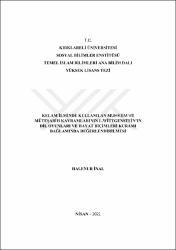Kelam ilminde kullanılan muhkem ve müteşabih kavramlarının L. Wittgenstein'ın dil oyunları ve hayat biçimleri kuramı bağlamında değerlendirilmesi
Özet
Kur'ân'ın nasıl anlaşılması gerektiği sorusu, üzerinde çokça düşünülen bir konu olmuştur ve bu konu hakkında temel İslam bilimleri içindeki hemen hemen her bir bilim dalı çeşitli düşünceler öne sürmüştür. Her bir disiplin konuyu kendi bakış açısına göre ele alarak bir yöntem geliştirmeye çalışmıştır. Bu yöntem arayışı kelam ilmi için de en önemli problemlerden biri olmuştur. Bu problem kelam düşünce geleneğinde, Kur'an ayetlerinin muhkem-müteşabih olarak ikiye ayrılması şeklinde kendine merkezî bir yer edinmiştir. Çalışmamızda, L. Wittgenstein'ın ortaya koyduğu "Dil Oyunları ve Hayat Biçimleri" argümanının kelam ilmindeki muhkem-müteşâbih probleminin çözümünde kullanılıp kullanılamayacağına yer vermeye çalıştık. The question of how the Quran should be understood has been a subject that has been considered a lot. Almost every branch of science in Basic Islamic Sciences has put forward various thoughts on this subject. Each discipline has tried to develop a method by considering the issue from its own point of view. This method search has been one of the most important problems for Kalam Science. This problem; In the tradition of kalam thought, it has gained a central place in the way that the verses of the Quran are divided into two as muhkam-mutaşâbih. In our study; We tried to include whether the Language Games and Forms Of Life argument put forward by L. Wittgenstein can be used in the solution of the muhkam-mutaşabih problem in Kalam Science.
Bağlantı
https://tez.yok.gov.tr/UlusalTezMerkezi/TezGoster?key=9MiDp3x86xrwjpi5-14w-cPmUes4Sc70nXgfQCCms1xjpZYDqI5BE8M-5sqWBuVyhttps://hdl.handle.net/20.500.11857/1568
Koleksiyonlar
- Tez Koleksiyonu [311]



















